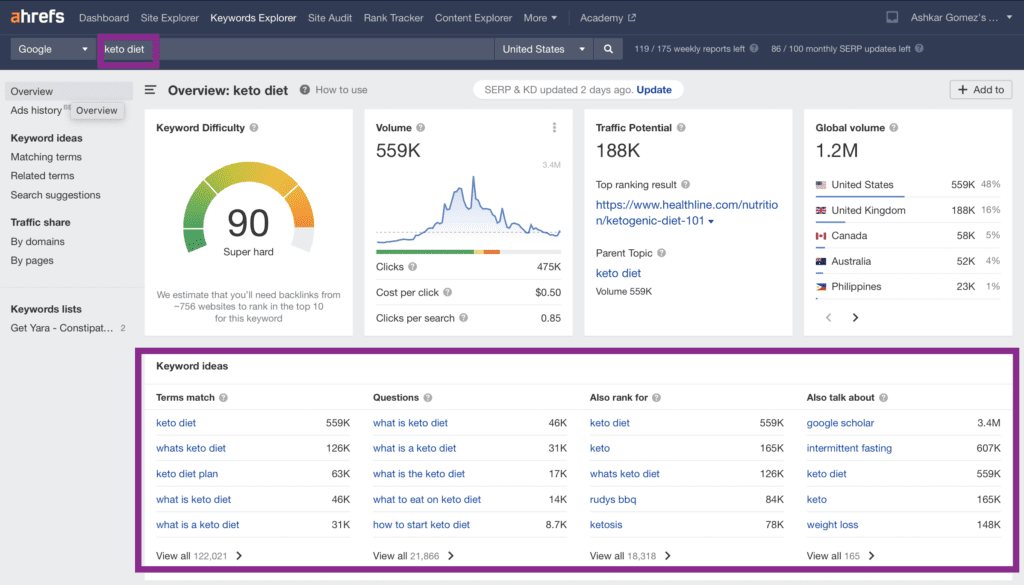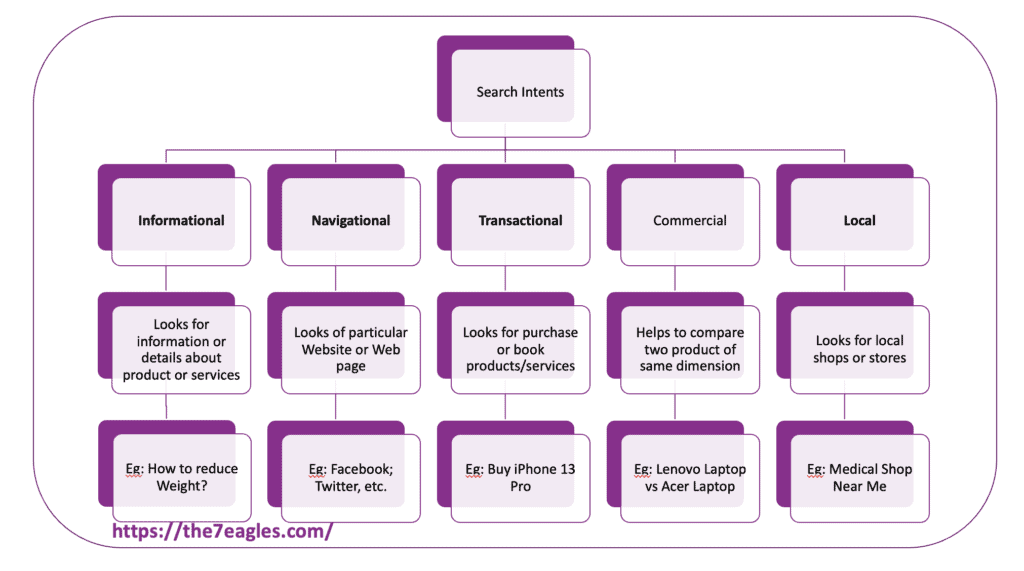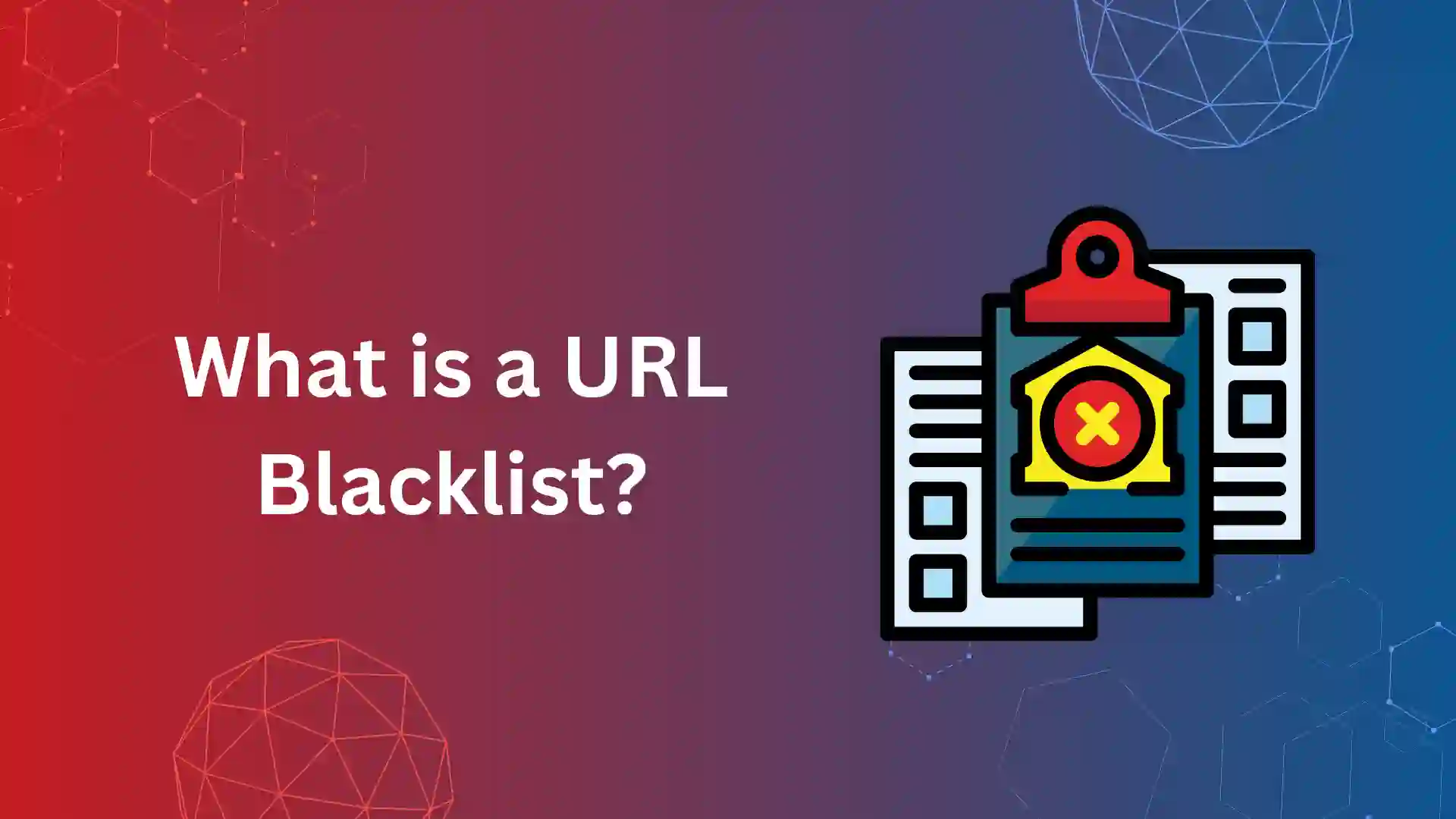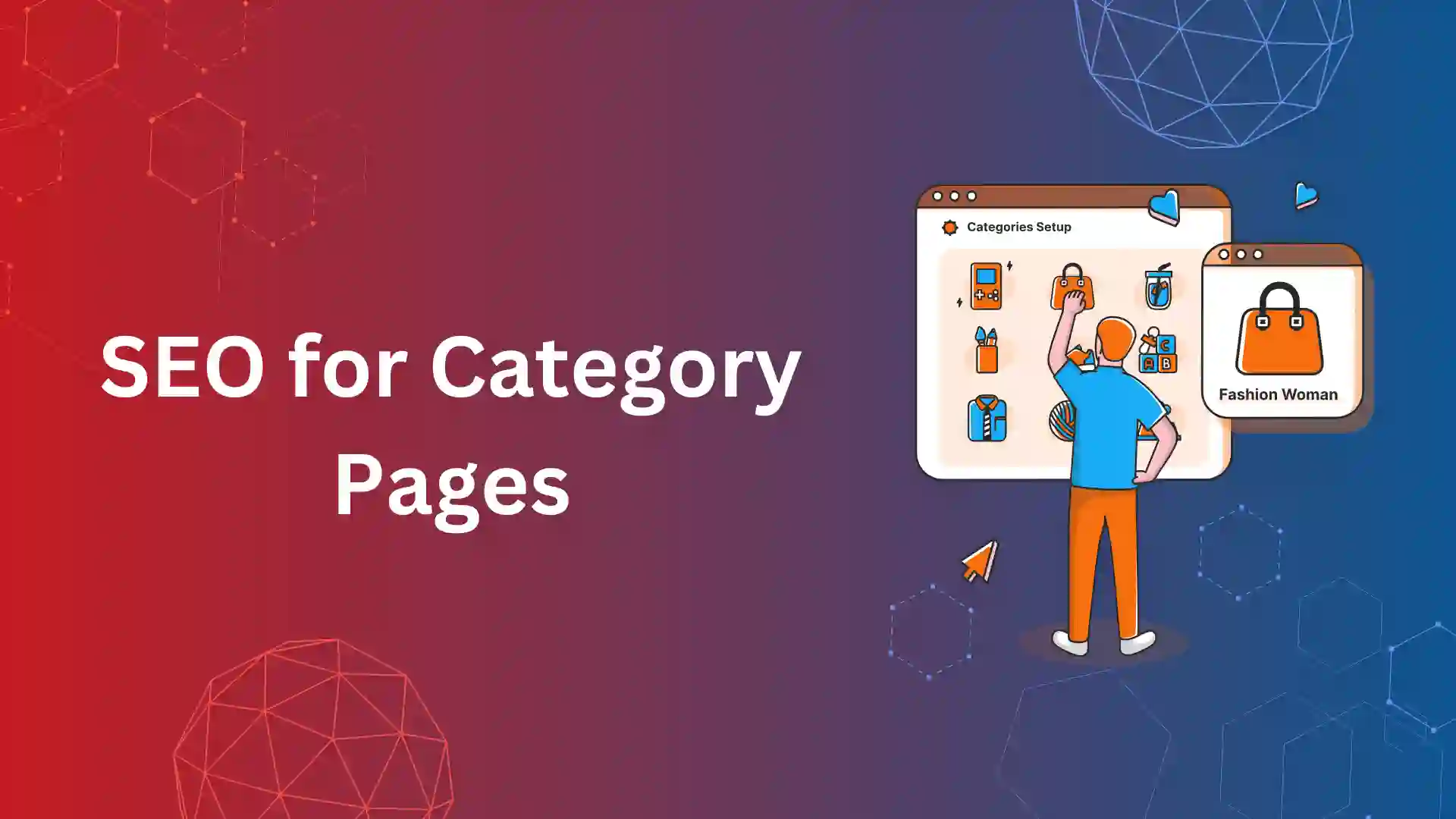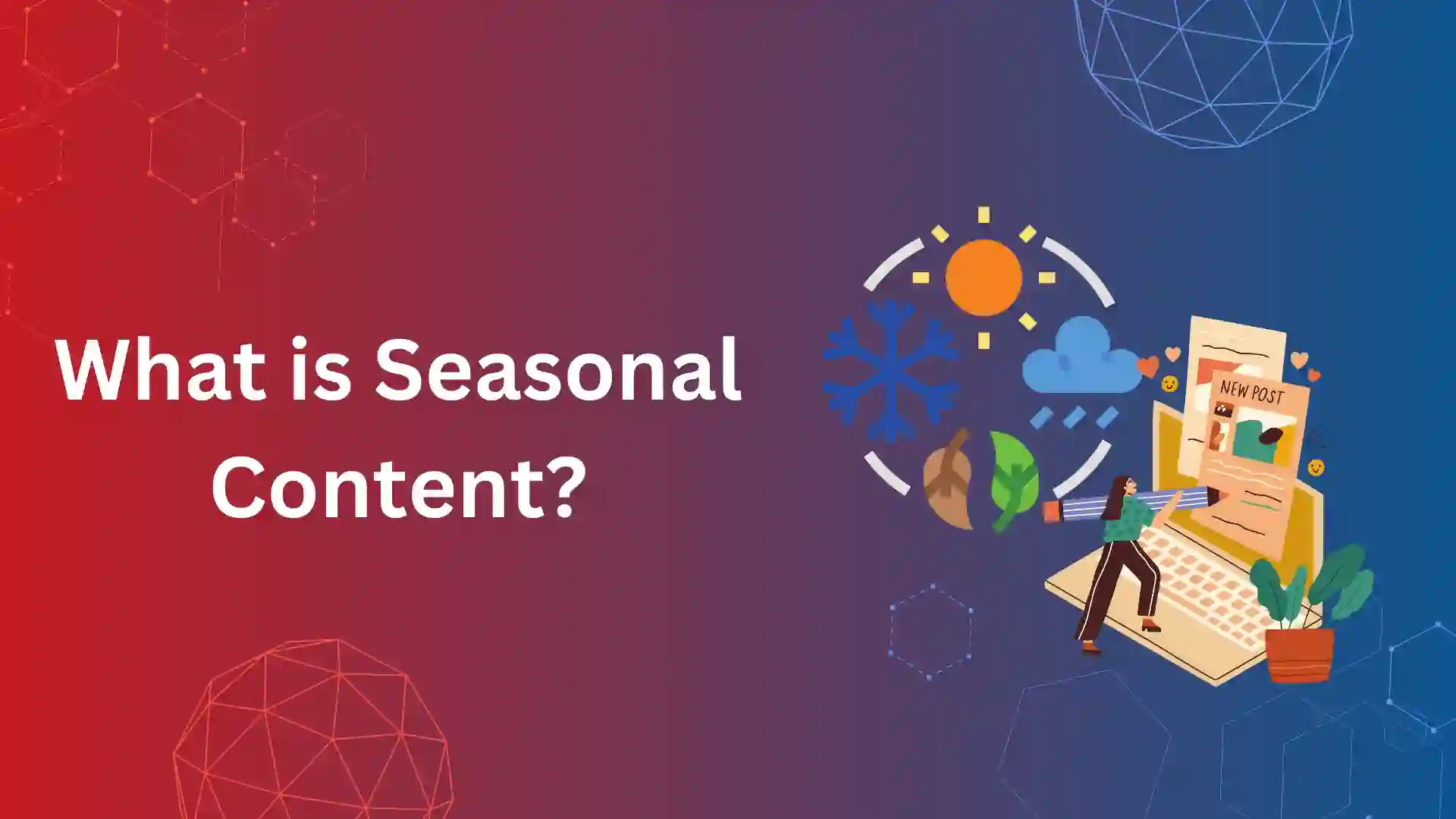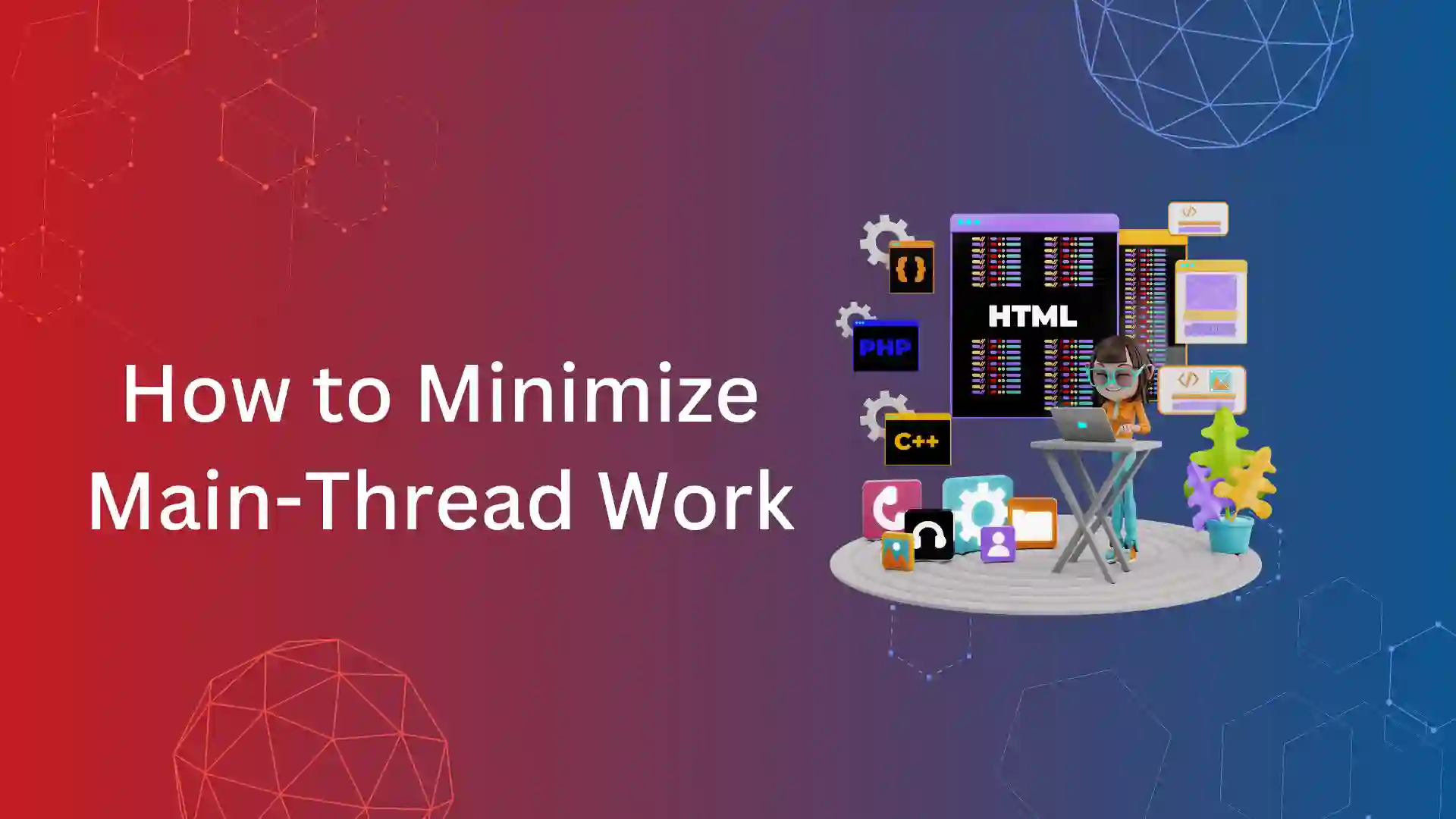Many website owners or SEO practitioners wonder why they don’t get organic traffic, even after posting several contents. The answer is they are not doing proper keyword research.
Keyword research is one of the vital steps in on-page SEO. Keywords are the base of any content on a web page.
You need to optimize your website following the user’s search intent as an SEO practice. Keywords are the only way of matching the user’s intent and help optimize the web pages with quality content.
In simple words, keyword research helps us understand the audience and what they exactly need. Search engines are answering machines that try to provide quality information following the user’s intent.
The purpose of this article is to give you all the details about the following:
- What is keyword research?
- Why is keyword research important?
- How to do keyword research for SEO?
- How to start with keyword research idea?
- What are the different types of search intent?
- What are the keyword research tools?
When an SEO process fails to initiate strategic keyword research, the chance of getting organic traffic plunges by 90.62%.
It is essential to learn and work on improving the keyword pulling strategies to enhance better SEO services. However, if you feel you are short of preparing intent-based keyword research, you can reach us
What Is Keyword Research?
Keywords are the phrases used by any users to get specific information. It becomes the bridge between searchers, search engines, and publishers (website).
Extracting keywords that can bring organic traffic by matching user intent is known as keyword research.
According to Ahrefs SEO Statistics, “92.42% of keywords only get less than or equal to 10.” Also, 90.63% of web pages don’t get any organic traffic.
In recent times, Semrush has added a new feature of analyzing the intent of any keyword.
The relevant keywords get more visibility over the eye of search engines and serve the searcher before which have a basic idea about search engine optimization (SEO).
Over there, you would have understood the types and ways of finding keywords.
Many digital marketers or agencies fail to have much impactful research on the key phrases of their audience. This is the gap between planning the business and targeting the audience.
The process is more time-consuming yet effective. Marketers don’t have the patience to mind map and choose the key phrases.
Let us understand its importance in how to choose in making an effective SEO.
Types of Keywords in SEO:
In general, keywords are classified as fat-head keywords, chunky-middle keywords, and long tail keywords.
In our SEO practice, we map fat-head and chunky keyword to fat-head keyword, and the remaining keywords to long tail keyword. The final one is intent-based keywords.
Fat-head keywords contribute around 30% of the total keywords, and long tail keywords are 70% in total.
Keywords with more than 3 phrases are termed long tail keyword and less than 3 phrases are fat-head keyword.
Intent-based keywords are an advanced type of keyword research practice that helps to identify converting keywords.
The conversion can be taking any action like purchases in website. So, intent based keywords are necessary for every SEO practices.
How to Do Keyword Research for SEO?
Keyword research strategies and tools help you know the information on the intent of your target audience.
This research helps in business growth through SEO.
Before starting keyword research, you must gather information like
- type of business and their goals,
- how to understand the customers,
- how customers reach the business, and
- how to increase sales.
Many people are using shortcuts because keyword research will take time.
So you need a clear focus on what the audience wants.
You can build a campaign that targets arbitrary terms using that keyword data.
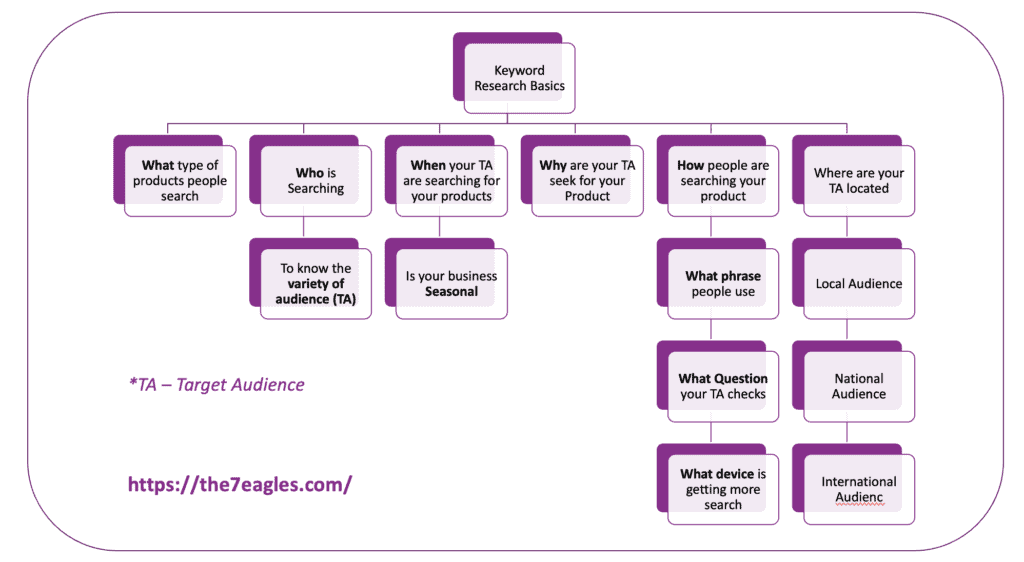
For example, you can take Sotto Mare, one of the best food restaurants in San Francisco, California.
Suppose you want to increase the visibility of Sotto Mare’s website in SERPs. The first step is keyword research related to the business and target audience.
Before that, you have to understand a little more about who the target audience are by asking the following questions.
1. What type of hotels are customers searching?
- Veg
- Non-Veg
- Arabian
- Seafood
- Chinese
2. Who is searching for this business?
- Travelers
- Bachelors
- Working officials
- Event Coordinators
- Business People
3. When are people searching for restaurants?
- Some special occasions or events
- Traveling time
- Holidays
- Festival time
This business will work out in all kinds of seasons.
4. How are customers searching for the restaurant?
i) What are the words they use to search?
- Hotels near me
- Restaurants near me
- Best restaurants in San Francisco
- Best food restaurant in San Francisco
- Best non-veg hotels near me
- Best hotels in San Francisco
- Best hotels near me
- Sotto Mare
ii) Device your target audience uses the most?
Mobile devices are the most common source of searches.
5. Why are people seeking restaurants?
- For food
- To relax
- To catch up with friends
- For family events
6. What are the potential customers located?
- Local
- National
- International
How to Start with Keyword Research Idea?
It would be best to discover new keywords (seed keywords) based on the products or services.
Enter these key phrases in keyword research tools like Google Keyword Planner, Ahrefs, or SEMrush by locking your target location.
The result of the keyword explorer will provide details like
- search volume,
- keyword difficulty,
- global search opportunity,
- suggestive keywords,
- questions around the keywords,
- Cost Per Click (CPC).
You have to find the seed keyword and enter that in the keyword research tool to get more keyword ideas.
Post then, collect as many keywords related to the seed keyword and download them in excel.
From that choose the keywords with high search volume and low keyword difficulty.
These keywords can help the web page rank quickly in the search engine and bring the initial set of organic visitors.
Then with internal links, built the higher keyword difficulty, and so on.
For example, a photographer who specializes in weddings.
- Seed keyword “Wedding Photographer.”
- If you put this keyword in the keyword research tool, you get other new keywords like wedding photography, average cost of wedding photographer, wedding photographer near me, etc.
- Select keyword with low keyword difficulty and high search volume.
Importance of Search Volume in Keyword Research
Once the seed word is determined, the following process will be choosing the long-tail keywords for quick ranking in SERP.
What is most important? Ideally, a keyword on page one should have a higher search volume.
As per research, the first post on the first page gets approximately 33% of organic clicks (traffic).
The second and third posts get 17% and 11%, respectively.
Ranking on the first page or in the first position of a search engine will attract traffic or visitors to the website.
Being in the top spot and not getting any organic traffic is like targeting the wrong audience.
For example, we consider the keyword “YouTube Marketing Agency in India” is ranking in first position on the first page.
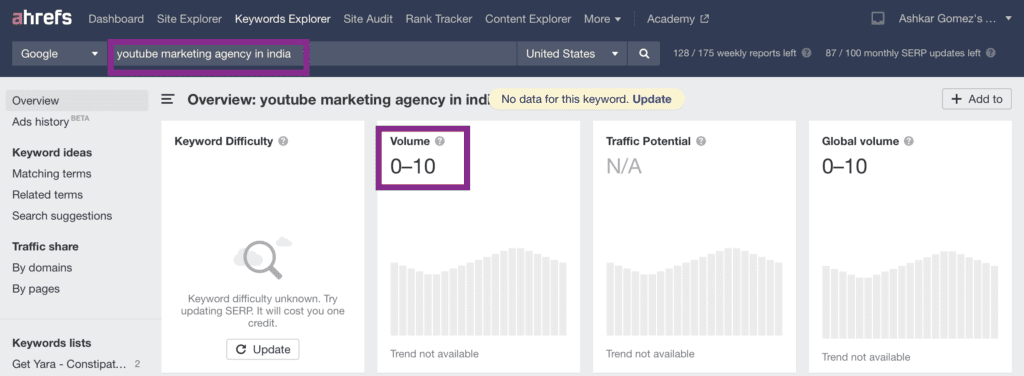
But, the search volume is 0–10 per month.
So, the maximum organic traffic you can get in a month through this keyword is less than 1.
It is just an immaterial effort to target these keywords and waste energy in backlinks and other stuff.
On the other side let us take a keyword “how many eggs per day can someone eat on keto diet.”
The search volume is 4800 in the United States.
Even if your website is placed in tenth position on the first page, minimum organic traffic will be between 48 and 60 per month.
Hope this makes sense, as our priority is intent, search volume, and long tail keyword.
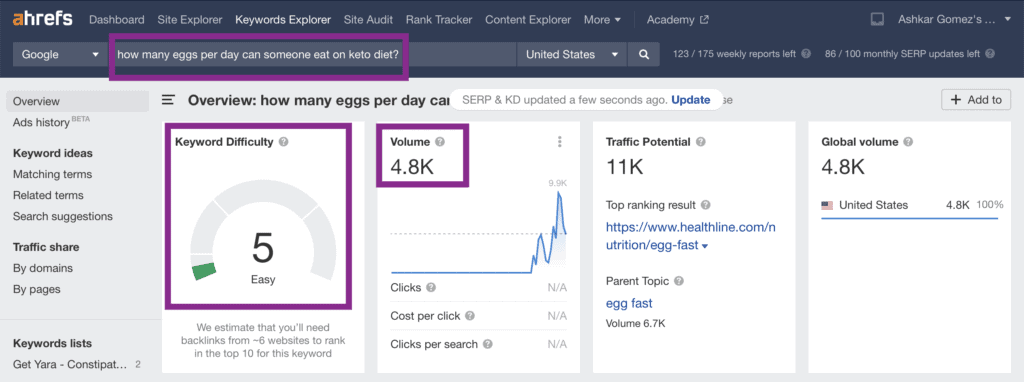
In any keyword research tool, there will be an option to export the keyword ideas in Google sheets or excel sheets.
You can easily filter the moderate search volume keyword with less competition.
Optimize the Long-Tail Keywords in Keyword Research:
From the basics of keyword research, you can get an idea of how to frame the long-tail keyword.
Internet user doesn’t use exact phrases while searching for information or transactions in the search engine. Instead, the user targets specific information, consisting of 4 to 5 phrases.
The intent of the search will be evident on what exactly they need, either information on an issue or a product that solves that issue.
Example: “What can you eat on the keto diet.” The keyword has 3.8K search volume.
The intent behind this search is particular to “what a keto diet follower should eat,” and the purpose behind the inquiry is informational.
Working on long-tail keywords is the wise methodology to rank the web page without much effort and time.
At the same time, a long tail keyword holds the ability to convert the user and take action on the intent of the keyword.
Keyword Research Strategies
The keyword research strategies are performed by some common practices that we apply on a daily basis. In this section, you will be dealing only with the basic strategies, as t
here are multiple keyword research tips available.
Keyword Suggestion by Seed Keyword:
This is one of common way of researching number of keywords with the help of seed keyword or niche keyword.
Every Keyword Research tools provide you similar keywords, and suggestion on keywords.
From the above image, you can finds the keyword ideas for the seed keyword “Keto Diet”.
So, you can work on these keywords, and find more suggestive keywords in this way.
Keyword Research by Competitor Analysis
The competitors are the websites that appear on the 1st page of the search engine result page (SERP).
Take a list of the in an excel sheet
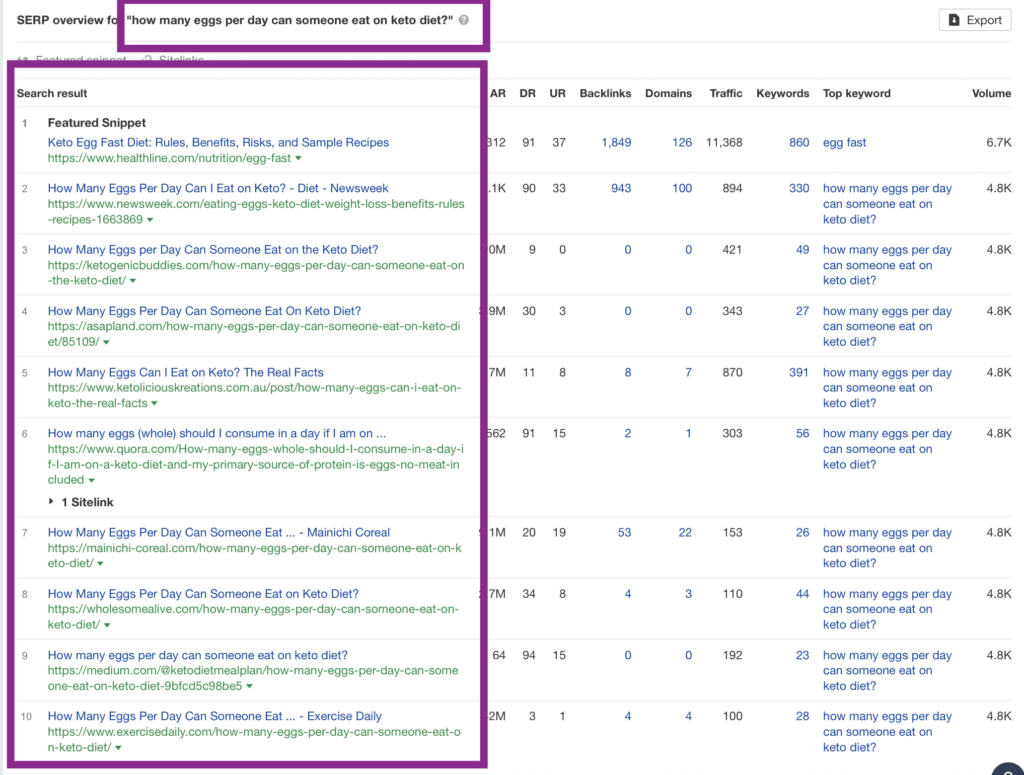
You can check the above image containing 10 web pages for the keyword “How Many Eggs Per day can someone eat on the keto diet.”
The seed keyword is “Keto Diet.”
As these web pages rank for topics related to the keto diet, we can get some more ideas or keywords related to the seed keywords.
For this, we usually recommend keyword research tools like Ahrefs or SEMrush.
Once you get the top 10 competition websites, just pick any website domain, and place them in Site Explorer of Ahrefs or SEMrush. (we can pick ketogenicbuddies.com).
You will get the details like DR, UR, backlinks, referring domains, organic keywords, and organic traffic.
From there you should click on Organic Keywords to get all the keywords that rank for the domain.
Following that, filter the keywords by entering the seed keyword “keto diet”.
You will get as many keywords related to the seed keyword.
Download the complete list in excel sheet, and built content with high search volume, low competition keyword
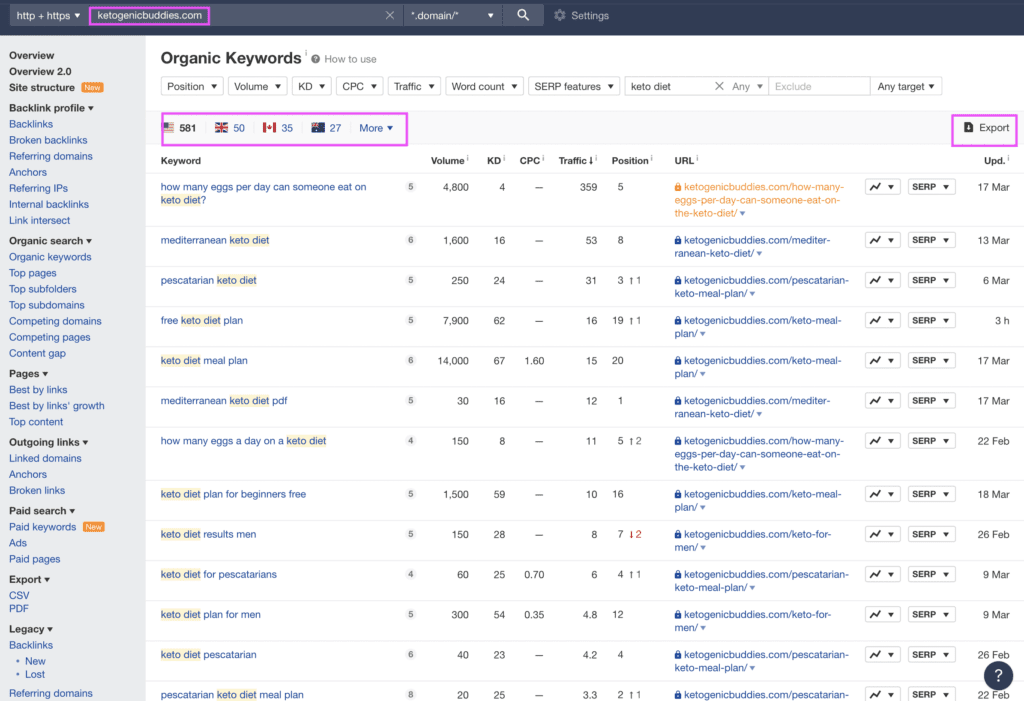
Keyword Research by Autosuggest
Autosuggest are commonly know as LSI keywords. When you place “Seed Keyword” followed by placing a space, you will get so many keyword ideas.
This type of keyword research helps in finding more long tail keyword keywords around the niche topic, and helps in creating a topical authority contents.
As same way, while you place the cursor in front of the seed keyword with a space, will provide you keyword ideas like best, top, important, complete, etc.
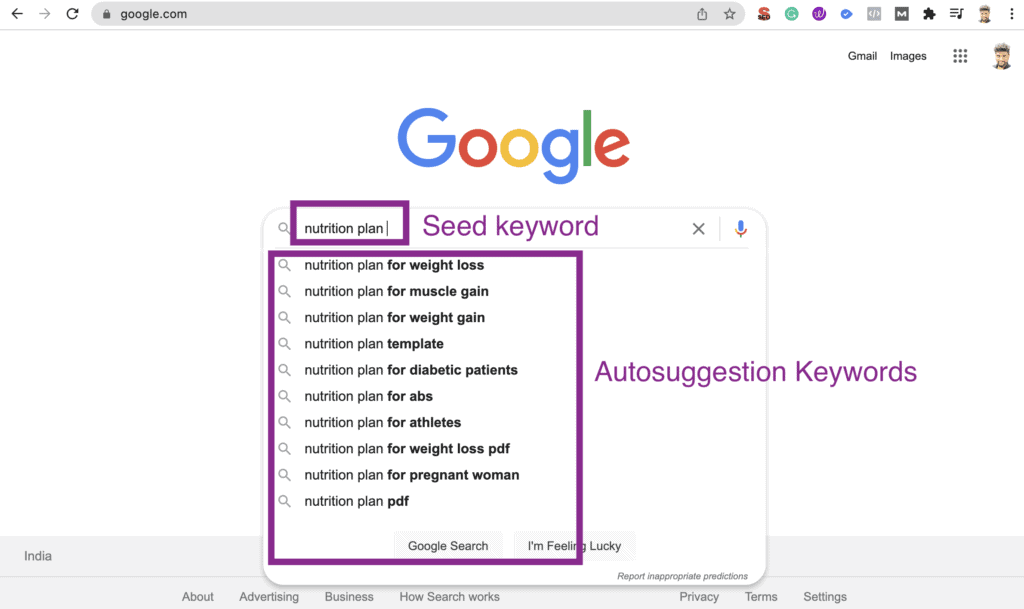
Keyword Research by Answer the Public:
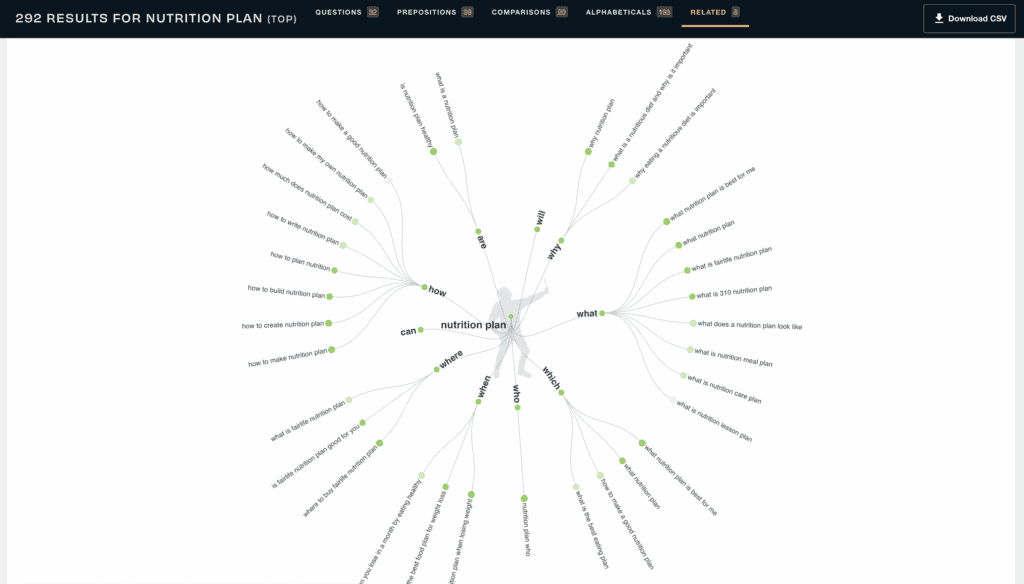
Different types of Keyword Search Intent:
The major categories of possible search types are
- Informational Queries
- Navigational Queries
- Transactional Queries
- Commercial Investigation
- Local Queries
Informational Queries:
When a user search for information about the particular business or services or products, its uses, method of action, etc.
Eg.
What are the benefits of Protein Powder?
How to DIY Candle Making Kits?
Navigational Queries
When a user tries to navigate to a specific website or web pages like Facebook, Instagram, etc.
Transactional Queries
When online users search to buy a flight ticket or buy any products, or book services.
Like these transaction-based queries is called transactional queries
Eg:
Buying Cinema tickets online
Buy Ferrari
Commercial Investigation
When a searcher wants to compare the products and find the best one with the specific needs.
Eg
iPhone 10s VS iPhone 12s Max
Local Queries
When a searcher wants to find something locally like nearby shops etc
Eg
Hospitals near me
Google evaluates the searches to provide the most desired and relevant content for a particular keyword search.
When the search intent is unable to understand, Google includes some “refine by” features to specify what they are precisely looking and the search engines provide better results for that to accomplish the task.
Google can be served upon the query, and the intent behind them. So get the focus keyword search it and look SERP results to understand what type of content need to create to attract both search engine and users.
Here are a few professional tools that 7 Eagles use in day-to-day SEO practice.
- Google Keyword Planner
- Google Trends
- SEMrush
- Ahrefs
Still, many keyword research tools (Free and Paid) are available in the SEO market.
Google Keyword Planner
- It is a free tool, and it is the best and most common tool for SEO Services in Keyword Research.
- Google Keyword Planner is used to discover new keywords suggestions and get keyword ideas from the competitor’s website.
- You can also extract the information through google sheets and excel sheets.
- Generally, You can get search volume competition in all ranges.
Google Trends
- Google Trends is a valuable keyword research tool that provides historical data on monthly search volume.
- It is also a free tool that can compare the keywords and find the best one.
- It is an excellent tool for knowing the seasonal keyword.
SEMrush:
- SEMrush, is one of the best tool for keyword research where it holds more information that helps every marketer to target the proper one.
- It has introduced to mark the search intent of every keyword.
- You can get the details of search volume, KD, CPC, SERP features, and many more.
Ahrefs:
- Ahrefs is relatively the no.1 keyword research tool across SEO specialists across globe.
- The reason behind is the data Ahrefs holds for every Keyword.
- Ahrefs help in researching keywords in search engines like Google, Bing, Yandex, Baidu, Yahoo, Amazon, YouTube, etc.
- It provides a ton of keyword ideas, and suggestions.
- Same as SEMrush, it provides the data like search volume, KD, CPC, SERP features, etc.
Conclusion
- Keyword research is the process of extracting the keyphrases that help in targeting the right customer with similar intent.
- You can do this manual research as per the user’s intent. An SEO person has to think like a customer and ask questions about business related to themselves.
- You can do proper keyword research using SEMrush, Ahrefs, or Google Keyword Planner tools.
- Get new keyword ideas, search volume, keyword difficulty, CPC, etc., from professional keyword explorer tools.
- Also, you can access the ranking of competitor keywords from their site.
- You can get our keyword idea to get ranked in SERPs.
- All these processes aim to reach the target audience and increase business and traffic.
- Get our Comprehensive Keyword Research Services to discover the key terms that can bring your target audience into your site.


